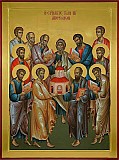The Orthodox Church was founded by our Lord Jesus Christ, and maintains an unbroken continuity of faith that began with the 12 Apostles at Pentecost. For nearly 2,000 years the Orthodox Church has maintained and protected the doctrine and worship established by the Apostles and articulated by the leaders of the early Church.
Today the Orthodox Church—the world's second largest, behind the Roman Catholic—consists of 15 self-governing churches. They are not held together by a central organization or a single figure wielding power, but are united by a common agreement about the faith, and through sacramental communion. St. Tikhon Mission is part of the Orthodox Church in America, which was granted autocephaly (independence) in 1970 by the Church of Russia.
Doctrine
We worship God in Trinity, glorifying equally the Father, Son, and Holy Spirit. We believe that the Lord Jesus Christ is Son of God, begotten of the Father before all ages; that He is truly God, of one essence with the Father and the Holy Spirit. We believe that Christ Incarnate is also truly man, like us in all respects except sin. We worship the Holy Spirit as Lord and Giver of Life, Who proceeds from the Father. We honor and venerate the saints as those who have grown “unto the measure of the stature of the fullness of Christ” (Ephesians 4:13). We ask their intercession before God, knowing that they live in Christ and that nothing, not even death, breaks the bond of love we share with them in Christ. Of the saints, the Ever-Virgin Mary, the Theotokos (Greek: Birthgiver of God), holds a special place as “more honorable than the Cherubim and more glorious beyond compare than the Seraphim” (c.f. Luke 1:48).
Sacraments
The Orthodox Church recognizes seven common sacraments. Baptism, by triple immersion, and Chrismation are usually administered together. Chrismation, following Baptism, anoints one with the “Seal of the Gift of the Holy Spirit.” Through the Holy Spirit we are able to live the fullness of the Christian life. In Holy Communion one receives the very Body and Blood of Christ for remission of sins, the sanctification of soul and body, and life eternal. In Holy Confession the Christian, when truly repentant, receives from Christ, through the confessor, the forgiveness of sins committed after baptism. (The priest witnesses the confession but does not act "in the person of Christ.")
Ordination, Marriage, and Holy Unction complete the seven common, New Testament Sacraments. By the laying on of hands (Ordination) a bishop transmits divine grace to the person being ordained, linking him to the uninterrupted succession of Orthodox clergy from the time of Christ to the present. Divine grace also sanctifies the union of man and woman in matrimony. (Orthodox parish priests are usually married, but the marriage must precede ordination.) The Sacrament of Holy Unction brings healing to the infirmities of both body and soul, as God sees fit, through anointing with oil.
What does Theotokos mean?
Theotokos (Birthgiver of God) is a title for the Virgin Mary. Orthodox Christians love and honor (but do not worship) her because of our union with her Son. The attention given her in the Church also expresses our faith that Jesus Christ is truly human, born of a woman as we are--yet mysteriously He has always been God, so His human mother can be called the Mother of God. In many hymns she signifies the Church as the beloved bride of God; her exaltation as “more honorable than the Cherubim” is a sign of the exaltation awaiting all who “hear the Word of God and keep it,” as she did.
What are Icons?
Icons are paintings of Christ and the Saints. They must be painted according to a strict tradition because they are an important way the Faith is handed down and taught. Icons and crosses are kissed (“venerated”), but not worshipped, as a sign of our belief that in Christ God took a physical body, and became part of our physical world so we could know Him. Other human beings who unite themselves with Christ become holy (=saints) and the image of God becomes visible in them, so we honor their icons as well.
How can I join this church?
We don’t hurry anyone to join; God will lead people home in good time. But after visiting a while, if you wish to be a member, speak to the priest. Those wishing to be members are received as catechumens (learners), and usually spend several months to a year attending the services and learning the Faith. Then if they have not already received Christian Baptism they are baptized, and in any case are chrismated (anointed with oil as the “Seal of the Gift of the Holy Spirit”) and given Holy Communion, which makes them full members.
Easy-to-read handouts from the OCA:
Introduction to Orthodoxy - Pamphlets
Welcome to the Orthodox Church
The Divine Liturgy
Great Vespers
The Eucharist
The Eucharist: Preparation and Thanksgiving
Prayer
More pamphlets available at OCA.org
For a deeper dive:
Below are several articles from "These Truths We Hold" (Copyright 1986, St. Tikhon's Seminary Press). This extensive work, compiled and edited by a monk of St. Tikhon's Orthodox Monastery, details many traditions, teachings and practices of the Orthodox Church.
More articles from this collection available at sttikhonsmonastery.org





